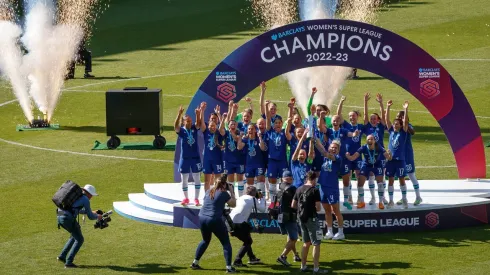The head of the Women’s Super League said she and other organizers of the English women’s top flight see record revenue in the future. The league wants to be the first women’s soccer league to break $1 billion in revenue. The WSL sets that target as a 10-year goal.
Dawn Airey, the chief executive of the Women’s Super League, outlined the disparity between men’s soccer and women’s soccer. Globally, women’s soccer generates $1 billion each year. By comparison, the men’s game surpasses $1 trillion each year. However, Airey and the Women’s Super League have a plan to build on the women’s game to rapidly grow its revenue.
“We look at the growth of attendances, we look at the growth of engagement and broadcast, we look at the increased interest in sponsorship and marketing opportunities, and then we start being more imaginative about what attending a women’s game means,” Airey said. “Not just watching the game, but everything that goes on around it, is there potential for clubs to think differently about their revenues?”
The Women’s Super League may be able to take inspiration from the Premier League, the most popular domestic league in the world. The Premier League is lining up to take over the WSL’s organization. That deal would not only inject cash into the WSL, but it would help set up a future TV rights deal. Unfortunately for the WSL, financial disagreements could put that takeover into question.
Women’s Super League revenue poses threat to NWSL
For American audiences, the WSL’s goal could put a strain on the growth of the National Women’s Soccer League. As of now, the top flight of American women’s soccer is one of the top leagues in the world. For example, the NWSL of the United States regularly competes with the WSL of England for the top women’s domestic league. The English division’s ambition could propel it beyond the NWSL.
Airey said the league is making good progress in its early plans to boost revenue in the Women’s Super League.
“Have we got the right financing? Can we establish this independent body to run and manage the leagues that’s properly financed? We’re working on the finances, we’re working on governance. How are decisions made? That’s complicated,” Airey said. “We are making good progress.”
PHOTO: IMAGO / PRiME Media Images















